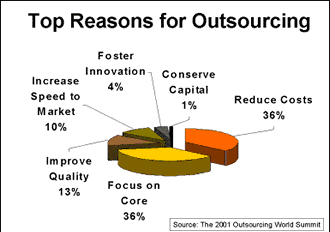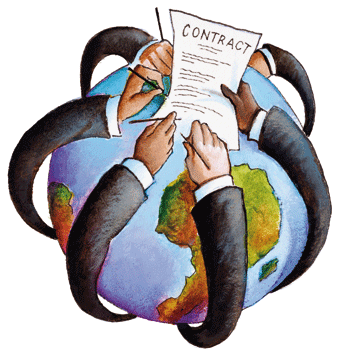The Benefits and Disadvantages of Outsource Manufacturing
by Jenny Knodell, IQS Editor

Many companies worldwide, large and small, rely on a business model called contract manufacturing, better known as outsourcing. The concept is simple—two companies divide the manufacturing and sales/marketing aspects of a business. One is a hiring firm, who comes up with the product specifications and brand. They then sign a contract with a contract manufacturer, the firm that produces and packages the components and products. In short, it’s a business agreement made to save time and money, as well as streamline the manufacturing process and provide a better made product. Here’s an example: A soft drink company has come up with a new recipe. They have it made by an established soda processing plant, who deals with buying the ingredients and managing the labor while they focus on branding the soda and making commercials and ads to sell it.
The benefits are obvious, making outsource manufacturing the first choice for the pharmaceutical, electronics, food processing, cosmetics, medical supplies and car parts industries, among many others. However, there are many complications and pitfalls that arise with this business model. Thankfully, though, they can be avoided by taking the necessary precautions.

Contract manufacturing is mutually beneficial to both companies involved. The hiring firm doesn’t need to purchase a manufacturing facility, equipment, machinery, raw materials or hire labor to process the goods. Instead, they are able to completely focusing on making sales, advertising and marketing the product and placing orders to the CM. Since the two companies almost always sign a contract that is usually 1, 2 or even 5 years, the manufacturing facility is guaranteed steady work and can better forecast their financial standing in the future. It also spreads out risk, and permits multiple companies to share it. If a product fails, the loss is divided up between all companies involved, which means it hurts each individual less.

In outsourcing, contract manufacturers give up all decision making to the other company. Once that contract is signed, one company is calling all the shots. If the wrong company is chosen, this could lead to some serious problems. Before signing anything, both companies should effectively and honestly communicate their mission, goal and the standards they are driven by. Differences in standards could lead to quality problems, since the outsourcing company is only motivated by profit. After the contract has been signed, the only way for the hiring firm to increase profit is to decrease expenses and compromise product quality, since they cannot reduce labor wages.
To many, the term outsourcing conjures images of lost American jobs replaced with Asian slave labor and a cheap product. While there are unfortunately many US companies that make the bad decision to outsource manufacturing to a country where the labor is dirt cheap at the expense of American jobs, it is definitely possible to stay honest and ethical if contract manufacturing is your company’s chosen path. Stay organized, have a strategy and always communicate openly with your outsourcing partner. If moral business practices are upheld, contract manufacturing could be an effective method of rapidly expanding your company.


 Castings & Forgings
Castings & Forgings Bulk Material Handling
Bulk Material Handling Electrical & Electronic Components
Electrical & Electronic Components Flow Instrumentation
Flow Instrumentation Hardware
Hardware Material Handling Equipment
Material Handling Equipment Metal Cutting Services
Metal Cutting Services Metal Forming Services
Metal Forming Services Metal Suppliers
Metal Suppliers Motion Control Products
Motion Control Products Plant & Facility Equipment
Plant & Facility Equipment Plant & Facility Supplies
Plant & Facility Supplies Plastic Molding Processes
Plastic Molding Processes Pumps & Valves
Pumps & Valves Recycling Equipment
Recycling Equipment Rubber Products & Services
Rubber Products & Services